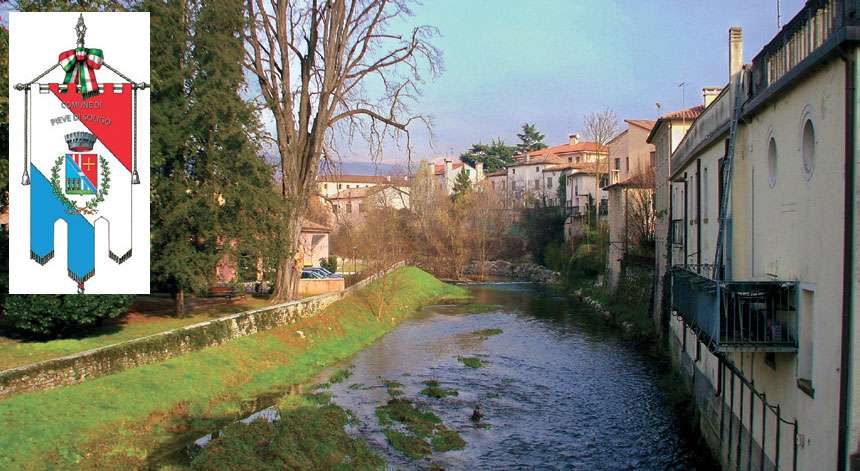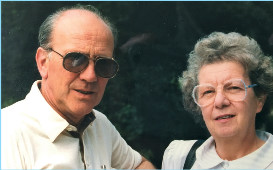
When we need food to eat these days, we just take a trip to the local shop or supermarket where the choice is both vast and instant. During the war years in Great Britain food was scarce and rationing was enforced. Here’s an Italian who tells how food or the lack of it shaped his future.
Giovanni Fontebasso
Chef & Hotel Manager

Glovanni Fontebasso was born in 1931, in north east Italy, in a small village called Pieve di Soligo. I have two brothers and one sister.
My parents were both professionals. My mother was a teacher, who became a head-teacher of a local school and my father was a music teacher. When I was young, Italy had a fascist leader, and things were difficult especially for my father. I can remember my father jokingly saying, “I’m not a fascist, I’m an organist”!!
I was just eight years old when the Second World War began. The area we lived in was a partisan area. (The partisans being an armed group who formed to secretly fight the Germans, occupying
Italy at that time). The consequences of this fact were quite serious for my family and local friends. It became really bad after the Italian armistice with the Allies, in 1943. It was during this period that things started deteriorating. I was 12 then, so I remember it well.
During the war feeding a family wasn’t easy. We survived because we lived in an agricultural area.
We had our own rabbits and chickens but getting meat and bread was difficult. The bread we ate was black and made with all sorts of strange things. We used to grow our own vegetables in our garden so we had a fairly good diet though there wasn’t much protein. We would supplement our diet with vegetable protein from beans and peas.
As a family we were quite well off really but that didn’t mean it was easy because food wasn’t available for us to cook. It was the time of the German occupation. Even in my village there were Germans and they raided everything. If somebody had food the Germans took it. They maintained a very strict regime.
A typical meal our family enjoyed was salami from the farmers who could get salami, polenta, cheese, hard cheese and radicule salad – which is an Italian red salad. I am including it in this month’s recipe “War Meal”, together with a vegetable soup starter and baked apple pudding. During the war we would have that quite often.
I can recall one day in 1944 during the war, when I was 13, and the Germans were actually staying in the village. My next door neighbour and I went to the local dairy to get some milk. All of a sudden someone said, “The Germans are coming! The Germans are coming!” So we obviously forgot about the milk and fled home. Then my father and my friend’s father took us into the hills. The reason was because sometime before this the Germans came and one of the partisans, a sharp shooter, killed one of the Germans in their convoy. There was a motorcycle in the convoy and the Captain was riding in a motorcycle sidecar. The partisan killed him, he killed the captain! The head of the convoy then came up for reprisal. The Germans killed six people in the street and took everybody they could find, youngsters, young men, sending them to a German concentration camp. Some people who were too young or too old were just dropped about thirty kilometres away and had to find their own way home.
While we were hiding up in the hills the Germans came looking for us. A partisan fighter came to tell us “You’d better get away from this farm.” He tried to find us another safe place. There were six of us in all – my father, myself, my friend and his father and two other people. Eventually we found a gulley with trees to hide us but a few hours later somebody said “I can hear someone talking in German”. So my father just pushed up to have a look and he saw these patrols up on top of the hills. But as my father came back into the gulley he touched a stone which fell against a tree and it shook the tree. Then we heard machine gun fire, some pigeons flew away and someone started laughing. We didn’t understand German but apparently they were saying “Do you want pizza for supper tonight?” It was a close shave! They would have killed us for certain. That is a time I will never forget.
We didn’t go home for about 10 days. Whilst hiding on this farm the partisans we were with captured a young German soldier. They were interrogating him and asking him questions which he wouldn’t answer. So they started beating him up. We were watching and that was when I lost faith in the partisans. He was such a young man of about 18, a bit older than me and my friend. I couldn’t understand what was going on. I was disgusted and tried to put it out of my mind. The following morning he was found dead. They just left him. Afterwards the Germans came and blew up the farm house and killed a lot of people.

During the German occupation if they saw more than three or four people clustered together talking, the Germans would split the group up because they thought they were plotting against them. The Germans occupied our village until 26th April 1945. It was a very difficult time for us.
‘I hadn’t seen white bread since before the war’
On 26th April 1944, I can remember the first British soldiers arriving in my village. They travelled in a troop carrier with about six or seven people in it and an officer on the top of the carrier looking around at the village and just speaking Italian. He was asking “Where are we? What is this place? Are the Germans here?” We replied, “No they have gone.” Then I remember they started eating sandwiches made of white bread!!! We were astonished – they gave us slices of white bread to eat! I hadn’t seen white bread since before the war!

Those days shaped my childhood and my future. I was educated in Italy where I went to primary school and secondary school but in 1949 my mother died. In my last year before university, I was supposed to go to university but I told my father “I’m not going”. My mother had died and my father was running the family on his own. It was hard for him. I decided to take a short course, a year and a half to become a primary school teacher. In 1951 I qualified as a primary school teacher.
It was difficult to find a job in Italy. A friend of mine who had become very important in Italy in the world of poetry, I suppose he was sort of the “Poet Laureate” for a while. He went to Switzerland so I joined him in Geneva. I worked in a restaurant doing odd jobs and an Italian friend invited me to go to work with him, in his hotel, completing an apprenticeship and I qualified as a cook. My cooking career started pretty casually.
I’d never had any previous experience in cooking, not even in my family home as we had a maid. We were well off in the sense that my mother had good pay and my father’s earnings were sufficient.
I had taught on and off for about 2 years before I went to Switzerland, in 1953. I thought it would be a temporary thing. But having qualified as a cook through the apprenticeship I enjoyed this work very much so I never went back to Italy.
In 1960 I came to England as a qualified chef. I arrived in Guildford and from Guildford someone found me a job in Bognor Regis. There was an opening in a new bar there with a Restaurant and Grill so I took that over. It was here I met Margaret, my future wife.
My intention was to have 2 years in England to improve my English, and then go to Germany. But I met Margaret and a year later we got married and there you are! That is how I fell in love with a beautiful English lady. We have been married 56 years. People ask me if it is really fifty six years to the same woman. Yes indeed.
We lived in Bognor Regis but in 1963 I was invited to open a new restaurant in Southsea, in Portsmouth. They put my name on the restaurant and offered me a partnership.
Sometime later I went to work for Trust House Forte, as a head chef at their three star Pendragon Hotel in Southsea. I was there for about seven years and in 1971 I was working all sorts of hours. I started at 8 o’clock in morning, through to 3 o’clock in the afternoon or 5 o’clock, sometimes 11 o’clock at night. Occasionally on Sundays the second chef got drunk so I would have to go in.

At that time I had started a course in Hotel Management and when I had finished part 1, I began to look for another job. I had various job offers. One as a lecturer at Southsea Portsmouth College of Technology, one at the Hospital and another with Trust House Forte. Then another one at Cranleigh school which offered more money and was more Management than cooking. So I went there as Catering Manager, cooking for 700 pupils over two schools. The beauty of it was that by 7 o’clock I was finished. I had five weeks holiday in the summer, two weeks holiday at Christmas, and two weeks holiday at Easter and lived in Cranleigh, in a school house.
I really enjoyed the job. I liked managing a staff of 80. There were about fifty full-time staff between the two schools. I did all the catering for both schools, the entire purchasing etc. I would work it out week by week and prepared five weeks’ menus and did all the ordering for that.
I had a budget of £1.25 per day, per person. That covered three meals each plus sports and extras. I never overspent. I always had a little bit over for perhaps a staff party at Christmas or something like that. I enjoyed it. I had four chefs and two assistant chefs in the kitchen and various other staff, mainly in the servery and cleaning of the department. They were all the part-time people, working in the evening, including those staff there were about eighty in all.
I stayed there for 15 years, from 1971 to 1986. In the meantime I bought my own house in Cranleigh. In 1986 I looked for another job and found one at Charterhouse in Godalming. There I had a higher status as it was quite a big job because I was the General Manager. I was in charge of some housekeeping as well. There were 700 pupils living in 11 Houses. Finally I was doing the job I trained for, as a qualified Hotel Manager.
I stayed there for 10 years!
I retired from catering in 1996 and started my next job of teaching Italian. The Head of Language department at Charterhouse asked me if I could teach GCSE Italian. I taught it for five years until they changed the curriculum. Then I got a job at Farlington, part-time at Cranleigh and part-time at King Edwards, teaching Italian GCSE, AS and A2, with very good results all the time.
I still enjoy living in Cranleigh. In my retirement I do a lot of charity work for the Rotary Club and try and encourage young people to achieve their goals in life











